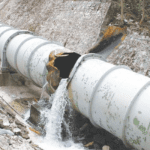Nigeria, often referred to as the “Giant of Africa,” is blessed with vast oil reserves, making it the largest oil producer on the continent. Oil revenue has played a pivotal role in shaping Nigeria’s economy, accounting for a significant portion of its national income. However, the country has been plagued by a persistent problem: oil theft. This illegal activity has had severe consequences on the Nigerian economy, hindering growth, fostering corruption, and depriving the nation of much-needed resources for development.
In this article, TVC News Senior Executive, Digital and Social Media, Wasiu Salami writes on ‘Oil Theft and its Consequences on the Nigerian Economy’
The Scope of Oil Theft in Nigeria
Oil theft in Nigeria is a complex and multifaceted issue. It involves the illegal extraction, refining, and smuggling of crude oil and petroleum products, often perpetrated by organized criminal networks. The thieves employ various tactics, such as pipeline vandalism, illegal bunkering, and even direct attacks on oil installations, to steal and divert oil for their personal gain.
Consequences on the Nigerian Economy
- Revenue Losses: Oil theft has resulted in substantial revenue losses for the Nigerian government. The stolen oil is sold on the black market, bypassing legal channels and depriving the state of crucial income that could be used for public infrastructure, social programs, and economic development. According to estimates by the Nigerian National Petroleum Corporation (NNPC), the country lost around $41.9 billion to oil theft between 2009 and 2018.
- Budget Constraints and Fiscal Instability: The significant revenue shortfalls from oil theft create budgetary constraints, forcing the government to cut spending on vital sectors such as healthcare, education, and infrastructure. This leads to a lack of investment in these areas, hindering human capital development and overall economic growth. The instability caused by inconsistent revenue inflows also undermines investor confidence and discourages foreign direct investment.
- Environmental Degradation: Oil theft is often accompanied by oil spills and environmental pollution. Thieves employ crude and unsafe methods to extract oil, damaging pipelines and infrastructure in the process. These incidents result in widespread contamination of farmlands, water sources, and ecosystems, posing serious health risks to local communities and affecting agricultural productivity. The environmental consequences of oil theft exacerbate the economic challenges faced by Nigeria.
- Social Implications: The proceeds from oil theft are often used to fund criminal activities, including insurgency, terrorism, and other forms of organized crime. This creates security challenges, particularly in the Niger Delta region, where most oil theft incidents occur. The presence of criminal networks also fuels corruption and exacerbates social inequality, further hampering economic progress and development.
Addressing the Issue
Addressing oil theft requires a multifaceted approach that combines law enforcement, technological advancements, and proactive government policies. Some key measures include:
- Strengthening Security: Enhancing security measures around oil installations, pipelines, and waterways is essential to deter oil theft. This involves increasing surveillance, deploying advanced monitoring systems, and improving coordination among security agencies.
- Collaboration with International Partners: Nigeria should collaborate with international partners to combat oil theft. Information sharing, capacity building, and joint operations can help disrupt transnational criminal networks involved in oil theft.
- Community Engagement and Economic Development: Engaging local communities and providing alternative livelihood options can help reduce their reliance on oil theft for income generation. This includes promoting entrepreneurship, vocational training, and sustainable development initiatives.
- Legislative Reforms and Deterrent Penalties: Strengthening existing laws and imposing stricter penalties for oil theft offenses can act as a deterrent. This should be accompanied by an efficient judicial system to ensure timely prosecution and punishment of offenders.
Conclusion
Oil theft remains a significant challenge for Nigeria, with far-reaching consequences for its economy and society. The government must prioritize efforts to tackle this issue through a comprehensive approach that involves improving security, addressing socioeconomic factors, and promoting sustainable development. By curbing oil theft, Nigeria can safeguard its valuable resources, promote economic stability, and channel funds towards sectors that benefit its citizens, ultimately fostering inclusive growth and prosperity.














